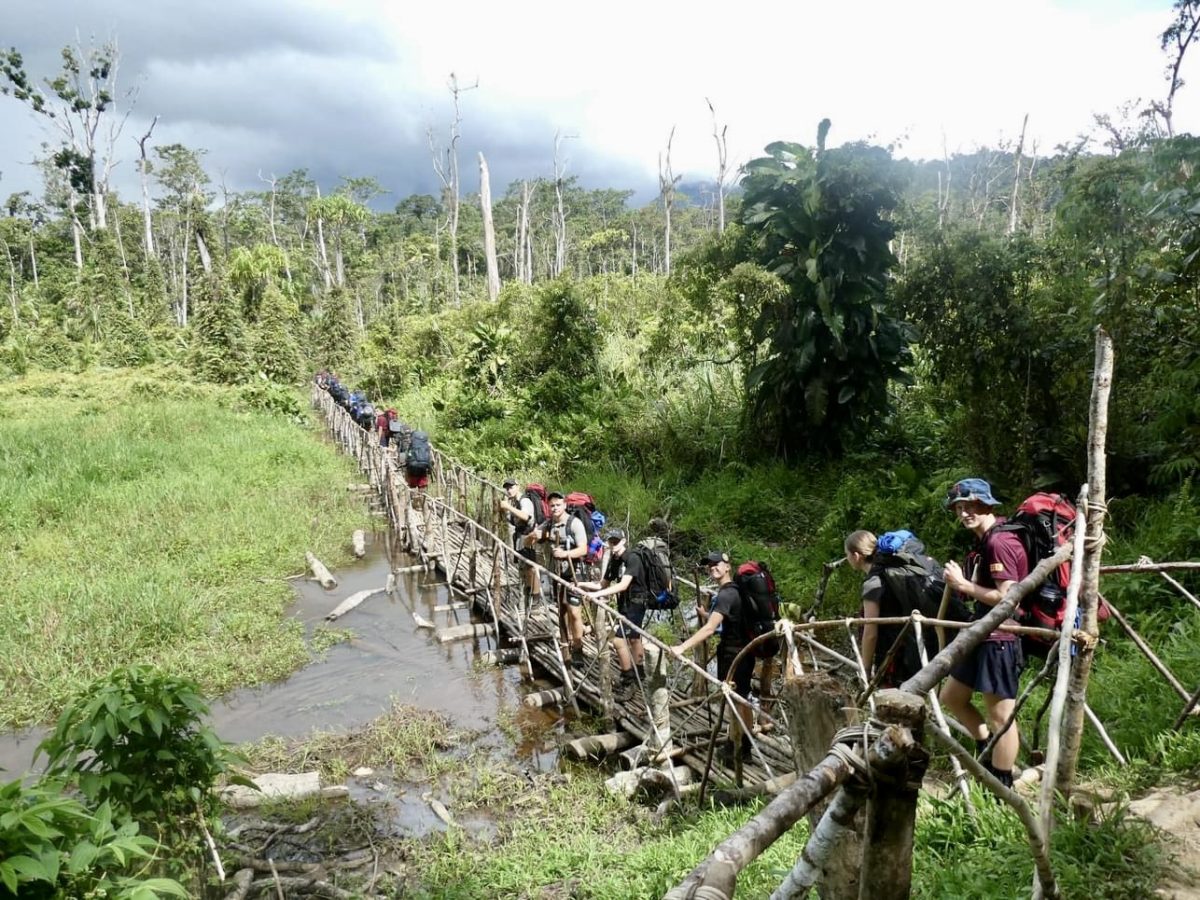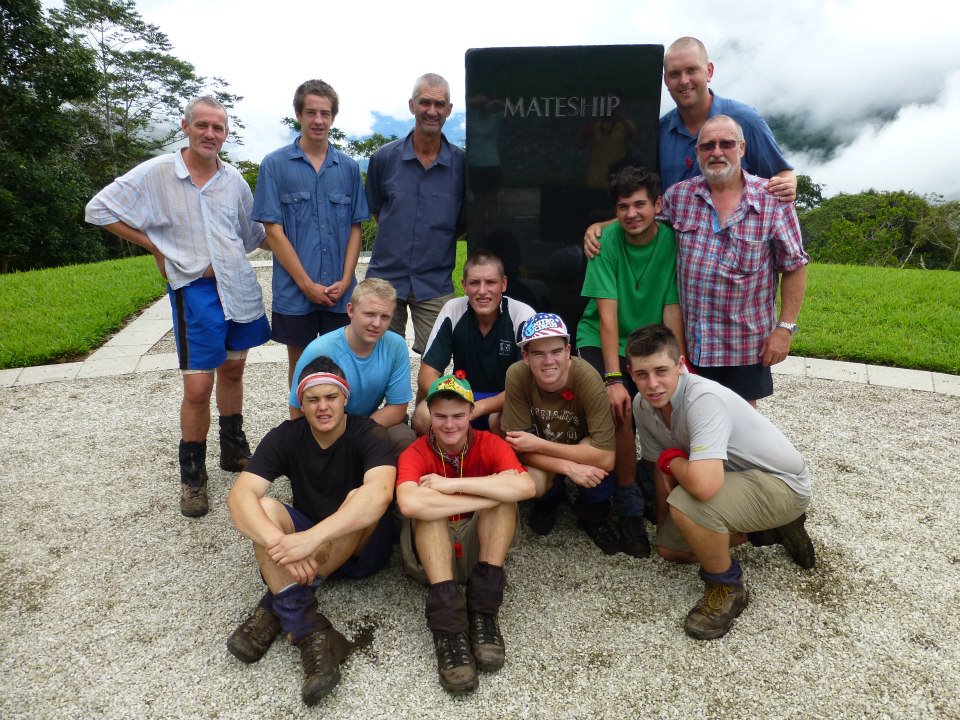
Just weeks ago, 15 students and five guides from Tumbarumba returned home after walking the Kokoda Trail in PNG. Photos: Tumbarumba Rotary Club/Facebook.
For more than 15 years, Tumbarumba’s Rotary Club has inspired largesse in its community simply by organising life-changing trips along the Kokoda Trail for the young people in Tumbarumba.
An idea that had its genesis in a conversation between fellow Rotarians about what the service club was doing for the future of youth in their town has now resulted in a total of 130 students completing the 96-kilometre single-file trail that runs through the beautiful and rugged Owen Stanley Mountain Range in Papua New Guinea.
The trail, considered one of the most challenging in the world, means anyone willing to take it on will spend around 50 hot and intensely humid hours at a pace of about two kilometres an hour, descending or ascending gorges in muddy and uneven terrain.
Sometimes the ascent so closely approaches the perpendicular that hands must assist feet.
But what emerges from that experience, as 15 young Tumba students and their five guides – locals Glen McGrath, Grant Harris, Jon Burgun, Brigid Rhynehart and Dianne Hall – discovered last month, has been life-changing among the groups that preceded them.
Everyone in the small mountain town of Tumbarumba knows about Tumba2Kokoda (T2K) and not just because of the six months witnessing the backpack-bearing students labouring up and down the town’s characteristic steep streets.
It’s the mouth-wateringly enticing scent of grilled sausages, bacon and onion that also seems to draw shoppers and residents to put their hands in their pockets kiosk-side to help raise vital funds for the project.
And then there are the cheque presentations that take pride of place in the local Tumbarumba Times as local businesses pitch in to help get the group airborne and en route to Port Moresby.
To that end, students are also tasked with landing at least 20 sponsors at $20 each.
This year there was also a fundraising trekkathon, which involved a trek up and over Tumbarumba Hill, an overnight camp, then a trek back to town to support 2009 T2K trekker and local teacher Alex Lilly, who ran 100 laps of Tumba Sportsground in aid of The Shaka Project.
And Alex is an example of what comes back from Kokoda: a transformative homecoming of spirited young adults whose hearts and minds are bigger than what left the town.
This week the town has been invited to see exactly what T2K 2024 was all about with a presentation night planned at the local golf club on Friday.
The students arrived home in the early hours of 27 April but by Sunday, some were playing netball and football, while others were giving their washing machines a run for their money.
For Bruce and Colleen Wright, whose own experiences of Kokoda and PNG, dating back to 1999, inspired the project, the return of this group has been heartening – given the T2K was cancelled for several years due to COVID.
The five-year hiatus was the longest since the program started in 2006 when the Rotarians and others took a leap of faith.

Bruce Wright (in red checked shirt) was one of the instigators of the T2K program, which, he estimates, has seen around 10 per cent of the Tumbarumba population walk the Kokoda Trail.
“The principal said we’d be lucky to get six kids,” Bruce recalled.
A few rough calculations on that number took cost estimates to about $45,000.
“People said we were mad, but we said, well, we’re supposed to be leaders in the community. We can do it,” Bruce said.
Thirty-one year 10 and 11 students from Tumbarumba High School immediately signed up.
Through tireless fundraising efforts such as street stalls, golf days, barbecues, raffles, and community and business donations, they raised the $84,000 oal required for that first trek, which also saw 18 students raise $1000 each to finally make the journey.
Since then, more than 230 locals have walked the Kokoda Trail, which each time, bar 2024, has included Bruce and Colleen, and each trip has offered new highs and lows.
“One year it was pouring rain the whole time, but the kids’ spirits stayed high,” Bruce said.
Reaching Abuari Village, where the Wrights long ago cemented strong friendships through community building programs, sparks particular joy and connection.
“The villagers treat us like family – it’s the highlight for me,” Bruce said.
Exchanging stories and gifts around the campfire creates bonds that last. On Anzac Day, they hold respectful dawn services reflecting on Australia’s input into wartime history.
“Before they leave, each student has to complete a project focused on a soldier who has walked the Kokoda Trail, so it becomes very personal,” Bruce explained.
Especially so for him; Bruce’s father was one of those soldiers.
The impact of the program has been immense. Past student Brigid Rhynehart, who trekked the Kokoda in 2013, now leads trips as a teacher herself.
Others have discovered an inner strength, much of it from letters of love and affirmation from their parents that they open halfway through the trip.
“I keep in touch with most of the kids who have done treks and I know they keep those letters and refer to them if they’re going through a tough time,” Bruce said.
After 15 dedicated years, Bruce, now in his 70s, hopes to retire with one final trek along Kokoda next year, this time, as has been the case several times in the past, with adult members of the Tumbarumba community.
Yes, about 100 local citizens have also taken up the challenge and travelled to PNG to trek the Kokoda, part of it to help raise funds for future student trekkers.
“When you think about it, about 10 per cent of the Tumba population has done Kokoda since this program first started,” Bruce said.
“I know this has been life-changing for individuals, especially the students, but it’s the community who have benefited in bonding and banding together to support this year after year, helping shoulder responsibility, sharing the experiences and reaping the benefits of young people who return with a new perspective on life.”







